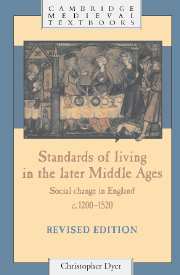Book contents
- Frontmatter
- Contents
- List of illustrations
- List of tables
- Preface
- Acknowledgements
- List of abbreviations
- Weights, measures and places
- Introduction
- 1 Late medieval society
- 2 Aristocratic incomes
- 3 The aristocracy as consumers
- 4 Aristocratic expenditure: making ends meet
- 5 Peasant living standards: modelling the peasant economy
- 6 Peasants as consumers
- 7 Urban standard of living
- 8 The wage-earners
- 9 Poverty and charity
- 10 The weather and standards of living
- Conclusion
- Medieval living standards – postscript
- Bibliography
- Index
- Cambridge Medieval Textbooks
8 - The wage-earners
Published online by Cambridge University Press: 05 June 2012
- Frontmatter
- Contents
- List of illustrations
- List of tables
- Preface
- Acknowledgements
- List of abbreviations
- Weights, measures and places
- Introduction
- 1 Late medieval society
- 2 Aristocratic incomes
- 3 The aristocracy as consumers
- 4 Aristocratic expenditure: making ends meet
- 5 Peasant living standards: modelling the peasant economy
- 6 Peasants as consumers
- 7 Urban standard of living
- 8 The wage-earners
- 9 Poverty and charity
- 10 The weather and standards of living
- Conclusion
- Medieval living standards – postscript
- Bibliography
- Index
- Cambridge Medieval Textbooks
Summary
Medieval wage-earners ought to be easier to investigate than peasants, merchants or craftsmen. Surely their incomes can be established with certainty, and their continued existence into modern times makes their style of life more readily understandable? In fact they pose as many problems as any other group, and we must establish firstly who earned wages. Two broad categories can be identified: servants, who were employed full-time by the year, and tended to live in their masters' homes, and labourers or journeymen, who took on short-term jobs, often by the day, and lived in their own houses. Both types have a long ancestry, as far back as Domesday, and by the thirteenth century both had become very numerous, through urbanization and the proliferation of smallholdings. Increased production for the market stimulated producers in country and town to employ labour.
In a small village like Cuxham (Oxfordshire) in 1300, about thirty households contained 150 or more people. The lord employed nine full-time famuli, and there were peasant employers with servants, notably John ate Grene, a free-holding kulak, Alice Beneyt, a widow, and the more prosperous half-yardlanders. The fourteen cottagers obtained some employment from the lord (£3 per annum was spent on agricultural wages), and were occasionally hired by their wealthier neighbours. At least twenty-eight wage-earners, full and part-time, amounted to more than half of the adult male population. This was in a mainly agricultural village with a high proportion of self-sufficient half-yardlanders, in which the lord used a great deal of labour services.
- Type
- Chapter
- Information
- Standards of Living in the Later Middle AgesSocial Change in England c.1200–1520, pp. 211 - 233Publisher: Cambridge University PressPrint publication year: 1989



